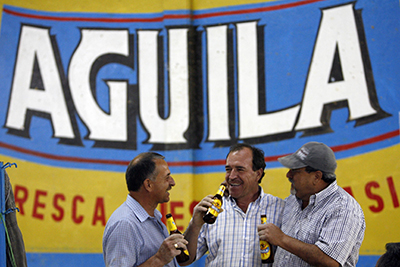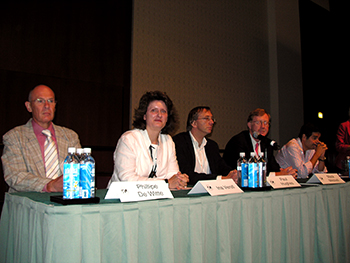The controversy over MillerCoors’ alcoholic energy drink, Sparks, underlines the claims made by our correspondent Ina Verstl in her paper at the EBC’s “Beer, Nutrition and Health” symposium that for as long as brewers continue to engage in the production of these beverages, they cannot expect that their claims “beer is good for you” are considered trustworthy.
It was a brief spell of three years at the helm. Massimo von Wunster, Regional President, Heineken Americas, has decided to leave Heineken and return to his home country Italy.
Warren Buffett, the so-called “Sage of Omaha”, admitted in a recent interview that he sold a large chunk of his shares in Anheuser-Busch prematurely.
The chief executive of Anheuser-Busch, August Busch IV is to receive a payoff and contract worth USD 125 million on completion of the deal with InBev.
Fortune Brands will receive USD 230 million in compensation for an early termination of its U.S. joint venture with Absolut under an agreement signed with Absolut’s new owner, France’s drinks group Pernod Ricard.
… especially if brewers from all over the world meet for their own Olympic World Brewing Congress. After Orlando and San Diego, Honolulu was the port of call for more than 800 brewing industry representatives from 2 to 6 August 2008.
They either did not pay him enough or his criminal energy ran high – Colombia’s attorney general’s office arrested on 13 July Sunday the treasurer of the country’s largest brewer, Bavaria, owned by London-based SABMiller.
InBev was lucky to secure such a large loan to finance its takeover of Anheuser-Busch. Banks are currently imposing much more stringent conditions for corporate borrowers, in a reversal of the balance of power during the years of plentiful credit.
Although the U.S. beer market has seen scant growth in recent years, Anheuser-Busch Cos. posted a 1.8 percent increase in second-quarter net income as the company boosted its dividend 12 percent ahead of its planned takeover by InBev and announced planned price increases this fall on 85 percent of its U.S. beer volume.
With the closure of the Goose Island Brewpub in Chicago’s Lincoln Park, the Siebel Institute has had to find a new classroom – which it has: in its office building.



